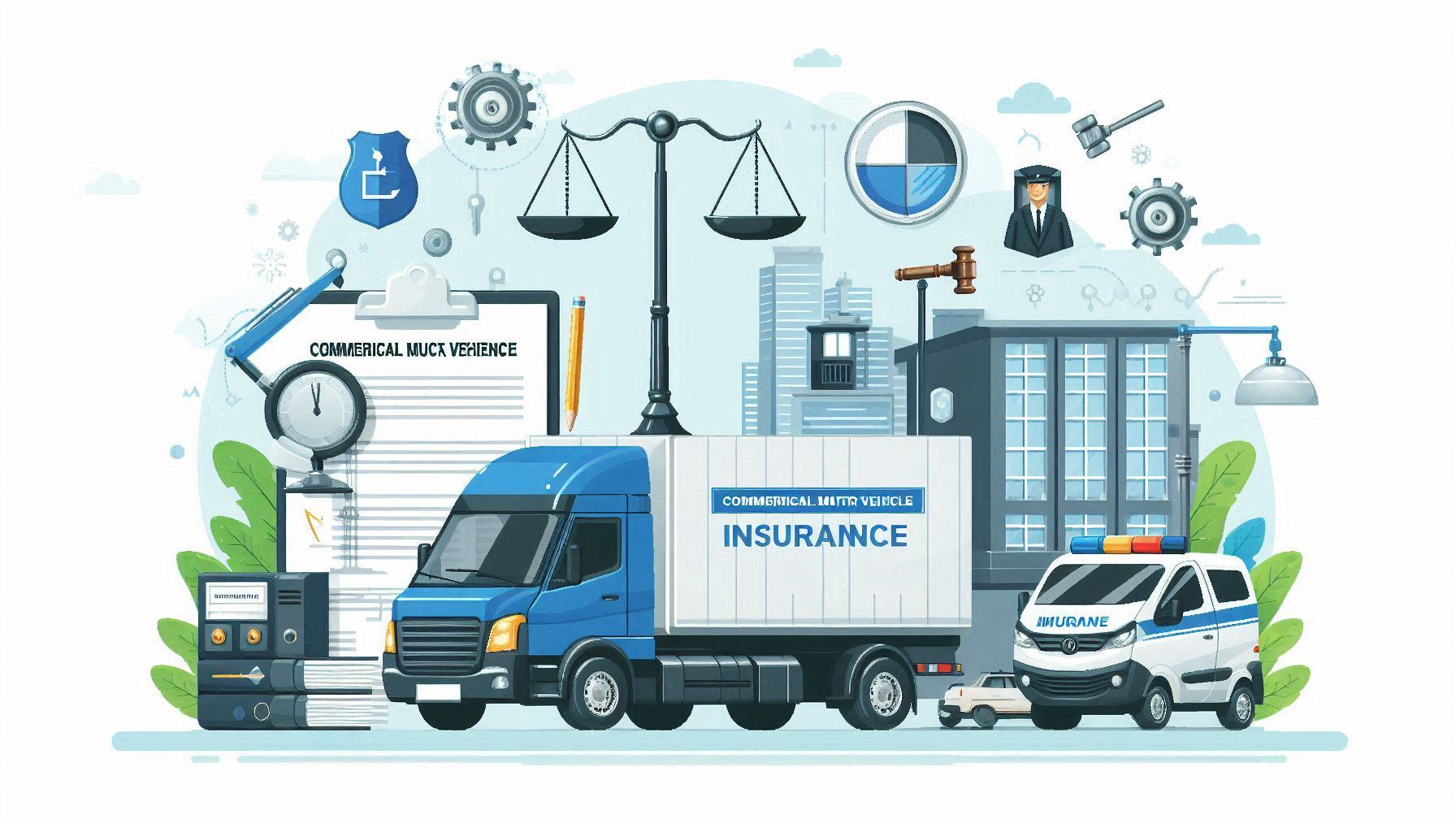Operating a business that relies on vehicles comes with many responsibilities. Whether you’re managing a single delivery truck or a fleet of vehicles, commercial motor vehicle insurance is not just a recommendation; it’s a legal requirement. Securing the proper insurance for your commercial vehicles protects your business, your employees, and the public. In this post, we’ll dive into the legal requirements and significant benefits of having commercial motor vehicle insurance, helping you understand how to keep your business compliant and safeguarded.
Table of Contents
What is Commercial Motor Vehicle Insurance?
Commercial motor vehicle insurance is a type of policy specifically designed to cover vehicles used for business purposes. It extends beyond personal auto insurance, offering protections tailored to the needs of businesses that rely on vehicles to carry out their operations. This insurance covers everything from delivery vans to heavy-duty trucks, ensuring businesses are protected against financial liabilities in the event of an accident, damage, or theft.

This type of insurance is essential for any business that uses vehicles for work-related purposes, such as transporting goods, employees, or equipment. Whether you’re operating a small business or managing a large fleet, commercial motor vehicle insurance helps mitigate risks associated with vehicle use in the course of business.
Legal Requirements for Commercial Motor Vehicle Insurance
One of the most important aspects of commercial motor vehicle insurance is adhering to legal requirements. The laws around commercial vehicle insurance vary by country, state, and the type of vehicle involved. Regardless of where your business operates, there are typically mandatory coverage requirements you must follow.
Federal and State Regulations
In the United States, the Federal Motor Carrier Safety Administration (FMCSA) oversees interstate commerce for businesses that transport goods across state lines. According to FMCSA regulations, all commercial motor vehicles must carry minimum levels of insurance coverage. This coverage ensures financial responsibility in case of accidents or damage caused during operations.
Each state also has its own set of regulations for businesses that operate exclusively within its borders (intrastate). These state-level laws dictate the minimum coverage businesses must maintain, which can vary widely depending on factors such as vehicle size, type of cargo, and the number of passengers transported. Ensuring that your business meets both federal and state-level requirements is essential to staying compliant.
Types of Coverage in Commercial Motor Vehicle Insurance
When it comes to protecting your business, understanding the different types of coverage under commercial motor vehicle insurance is crucial. These coverages offer comprehensive protection for your assets, employees, and operations.
Liability Coverage
Liability coverage is the cornerstone of any commercial vehicle insurance policy. It covers the cost of property damage and injuries to third parties resulting from accidents where your driver is at fault. This is legally required in nearly every jurisdiction, and the required minimum coverage amounts can differ depending on local regulations.
Physical Damage Coverage
This includes both comprehensive and collision insurance. Comprehensive coverage protects your vehicle from damages caused by events other than collisions, such as theft, fire, or vandalism. Collision coverage, on the other hand, pays for damages to your commercial vehicle if it’s involved in an accident, regardless of who’s at fault.
Uninsured and Underinsured Motorist Coverage
In the unfortunate event that your vehicle is involved in an accident with a driver who does not have adequate insurance, uninsured or underinsured motorist coverage can step in. This type of coverage helps cover the costs associated with damages caused by uninsured drivers, ensuring that your business isn’t left to cover those expenses out of pocket.
Cargo Coverage
For businesses that transport goods, cargo insurance can be a vital part of the policy. This coverage ensures that any damage or loss of cargo in transit is covered, protecting you from financial loss.
Hired and Non-Owned Auto Insurance
If your business uses rented vehicles or vehicles owned by employees for business purposes, hired and non-owned auto insurance is essential. This coverage protects in the event of an accident involving a vehicle that isn’t owned by your company but is being used for work-related tasks.
Benefits of Commercial Motor Vehicle Insurance
Beyond legal compliance, commercial motor vehicle insurance offers a range of benefits that can protect your business from financial losses and operational disruptions. These benefits can save your business money in the long run and provide peace of mind in daily operations.
Financial Protection from Accidents and Lawsuits
One of the most significant benefits of commercial motor vehicle insurance is the financial protection it provides in the event of accidents. Accidents can result in extensive medical bills, property damage, and potential legal fees if a lawsuit is filed. Having the right insurance in place ensures that your business doesn’t bear these costs directly, helping you avoid crippling financial losses.
Protection for Business Assets
Commercial vehicles are essential business assets that need to be protected. Insurance policies that include comprehensive and collision coverage ensure that your vehicles are covered in case of damage, whether it’s due to accidents, theft, or natural disasters. This protection ensures that your operations aren’t interrupted due to unexpected repair or replacement costs.
Reduced Liability Risks
With the proper liability coverage, your business is protected from claims made by third parties for damages caused by your commercial vehicles. This can reduce the risk of being sued and facing costly legal battles, allowing you to focus on running your business.
Maintaining Business Continuity
When accidents or damages occur, commercial motor vehicle insurance can help maintain business continuity. Whether it’s covering repair costs or compensating for damaged cargo, insurance ensures that your business can continue to operate smoothly without substantial delays or interruptions.
Improved Business Reputation
By carrying the appropriate commercial motor vehicle insurance, your business demonstrates responsibility and a commitment to safety. This can positively affect your relationships with clients, partners, and employees. A well-insured business is more likely to be trusted, which can lead to more opportunities and partnerships.
How to Choose the Right Commercial Motor Vehicle Insurance?
Selecting the right commercial motor vehicle insurance involves evaluating the specific needs of your business. With multiple coverage options available, understanding which policies are essential for your business can help you choose the right insurance provider.
Consider factors such as the size of your fleet, the type of cargo you transport, and how far your vehicles typically travel. Insurance needs vary depending on the type of business, and working with an insurance agent who specializes in commercial motor vehicle insurance can help you assess your options and find the best fit.
Factors That Affect Your Commercial Vehicle Insurance Premiums
Several factors affect how much your business will pay for commercial vehicle insurance. Being aware of these factors can help you budget accordingly and find ways to reduce costs.
- Type of Vehicles: Heavier or specialized vehicles typically result in higher premiums due to the increased risk and cost associated with potential damages.
- Driving Records: Businesses with drivers who have clean driving records may benefit from lower insurance premiums, as they present a lower risk to insurers.
- Location: Where your business operates can also impact premium rates. Areas with higher accident rates or theft risks may result in increased insurance costs.
- Coverage Limits: Higher coverage limits generally mean higher premiums, but they also provide greater protection.
By maintaining a safe driving record, regularly reviewing your policy, and working with an insurance provider that understands your business’s needs, you can find the best commercial motor vehicle insurance for your company at an affordable rate.
Conclusion
Commercial motor vehicle insurance is an essential part of operating a business that relies on vehicles. It not only fulfills legal requirements but also provides invaluable protection for your assets, reduces liability risks, and helps maintain business continuity. By choosing the right coverage, you ensure that your business remains compliant and protected from the unexpected.
In an increasingly competitive market, having the proper insurance can provide your business with the security it needs to grow and succeed. Stay compliant, protect your assets, and invest in the future of your business with commercial motor vehicle insurance.
FAQs
Do I need commercial motor vehicle insurance if I only have one vehicle?
Yes, if the vehicle is used for business purposes, commercial motor vehicle insurance is necessary, regardless of fleet size.
Is personal auto insurance enough for business vehicles?
No, personal auto insurance typically doesn’t cover vehicles used for business purposes. Commercial auto insurance provides coverage specifically designed for business-related activities.
What are the penalties for not having commercial motor vehicle insurance?
Penalties can include fines, suspension of business operations, and potential lawsuits.










